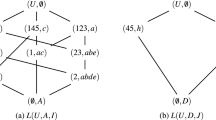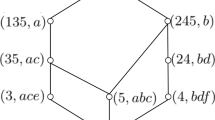Abstract
Formal Concept Analysis of real set formal contexts is a generalization of classical formal contexts. By dividing the attributes into condition attributes and decision attributes, the notion of real decision formal contexts is introduced. Based on an implication mapping, problems of rule acquisition and attribute reduction of real decision formal contexts are examined. The extraction of “if–then” rules from the real decision formal contexts, and the approach to attribute reduction of the real decision formal contexts are discussed. By the proposed approach, attributes which are non-essential to the maximal s rules or l rules (to be defined later in the text) can be removed. Furthermore, discernibility matrices and discernibility functions for computing the attribute reducts of the real decision formal contexts are constructed to determine all attribute reducts of the real set formal contexts without affecting the results of the acquired maximal s rules or l rules.
Similar content being viewed by others
References
Belohlavek R (2001) Fuzzy closure operators. I. J Math Anal Appl 262:473–489
Belohlavek R (2002) Logic precision in concept lattices. J Logic Comput 12:137–148
Belohlavek R (2004) Concept lattice and order in fuzzy logic. Ann Pure Appl Logic 128(1–3):277–298
Beynon M (2001) Reducts within the variable precision rough sets model: a further investigation. Eur J Oper Res 134:592–605
Burusco A, Fuentes-González R (2000) Concept lattices defined from implication operators. Fuzzy Sets Syst 114(3):431–436
Carpineto C, Romano G (1996) A lattice conceptual clustering system and its application to browsing retrieval. Mach Learn 10:95–122
Chen D, Wang C, Hu Q (2007) A new approach to attribute reduction of consistent and inconsistent covering decision systems with covering rough sets. Info Sci 177:3500–3518
Elloumi S, Jaam J, Hasnah A, Jaoua A, Nafkha I (2004) A multi-level conceptual data reduction approach based on the Lukasiewicz implication. Info Sci 163:253–262
Faid M, Missaoi R, Godin R (1997) Mining complex structures using context concatenation in formal concept analysis. International KRUSE Symposium, Vancouver, BC, pp 11–13
Gediga B, Wille R (1999) Formal concept analysis, mathematic foundations. Springer, Berlin
Georgescu G, Popescu A (2004) Non-dual fuzzy connections. Arch Math Logic 43(8):1009–1039
Godin R, Missaoi R (1994) An incremental concept formation approach for learning from databases. Theor Comput Sci 133:387–419
Harms SK, Deogum JS (2004) Sequential association rule mining with time lags. J Intell Info Syst 22(1):7–22
Hu QH, Xie ZX, Yu DR (2007) Hybrid attribute reduction based on a novel fuzzy-rough model and information granulation. Pattern Recogn 40(12):3509–3521
Jaoua A, Elloumi S (2002) Galois connection, formal concepts and Galois lattice in real relations: application in a real classifier. J Syst Softw 60:149–163
Ke LJ, Feng ZR, Ren ZG (2008) An efficient ant colony optimization approach to attribute reduction in rough set theory. Pattern Recogn Lett 29(9):1351–1357
Krajči S (2003) Cluster based efficient generation of fuzzy concepts. Neural Netw World 5:521–530
Liu M, Shao MW, Zhang WX, Wu C (2007) Reduction method for concept lattices based on rough set theory and its application. Comput Math Appl 53(9):1390–1410
Mi JS, Wu WZ, Zhang WX (2004) Approaches to knowledge reductions based on variable precision rough sets model. Info Sci 159(3–4):255–272
Popescu A (2001) A general approach to fuzzy concept. Math Logic Q 50(3):1–17
Skowron A (1993) A synthesis of decision rules: applications of discernibility matrix. In: Proceedings of the international conference on intelligent information systems, Augustow, Poland, pp 30–46
Skowron A, Rauszer C (1992) The discernibility matrices and functions in information systems. In: Slowinski R (ed) Intelligent decision support: handbook of applications and advances of rough sets theory. Kluwer, Dordrecht, pp 331–362
Starzyk JA, Nelson DE, Sturtz K (2000) A mathematical foundation for improved reduct generation in information systems. Knowl Info Syst 2:131–146
Wang GY (2003) Rough reduction in algebra view and information view. Int J Intell Syst 18:679–688
Wang X, Zhang WX (2008) Relations of attribute reduction between object and property oriented concept lattices. Knowl Based Syst 21(5):398–403
Wei L, Qi JJ, Zhang WX (2008) Attribute reduction theory of concept lattice based on decision formal contexts. Sci China Ser F Info Sci 51(7):910–923
Wille R (1982) Restructuring lattice theory: an approach based on hierarchies of concepts. In: Rival I (ed) Ordered sets. Reidel, Dordrecht, pp 445–470
Wu WZ (2008) Attribute reduction based on evidence theory in incomplete decision systems. Info Sci 178(5):1355–1371
Wu WZ, Zhang M, Li HZ, Mi JS (2005) Knowledge reductions in random information systems via Dempster–Shafer theory of evidence. Info Sci 174(3–4):143–165
Wu WZ, Yee Y, Mi JS (2009) Granular computing and knowledge reduction in formal contexts. IEEE Trans Knowl Data Eng 21(10): 1461–1474
Yahia S, Jaoua A (2001) Discovering knowledge from fuzzy concept lattice[A]. In: Kandel A, Last M, Bunke H (ed) Data mining and computational intelligence[C], Physica-Verlag, Heidelberg, pp 167–190
Yang XB, Yang JY, Wu C et al (2008) Dominance-based rough set approach and knowledge reductions in incomplete ordered information system. Info Sci 178(4):1219–1234
Zhang WX, Wu WZ, Liang JY, Li DY (2001) Theory and method of rough sets. Science Press, Beijing
Zhang WX, Mi JS, Wu WZ (2003) Approaches to knowledge reductions in inconsistent systems. Int J Intell Syst 21:989–1000
Zhang WX, Wei L, Qi JJ (2005) Attribute reduction theory and approach of concept lattices. Sci China Ser E Info Sci 35(6):628–639
Zhang WX, Ma JM, Fan SQ (2007) Variable threshold concept lattices. Info Sci 17(22):4883–4892
Acknowledgments
The authors are grateful to the anonymous reviewers and the editor for their constructive comments and suggestions for the improvement of the paper. This work was supported by grants from the National Natural Science Foundation of China (No. 60963006), the Sino Social and Science Program of Ministry of Education (No: 09YJCZH082), and the Hong Kong Research Grants Council (CUHK 4126/04H).
Author information
Authors and Affiliations
Corresponding author
Rights and permissions
About this article
Cite this article
Yang, HZ., Yee, L. & Shao, MW. Rule acquisition and attribute reduction in real decision formal contexts. Soft Comput 15, 1115–1128 (2011). https://doi.org/10.1007/s00500-010-0578-y
Published:
Issue Date:
DOI: https://doi.org/10.1007/s00500-010-0578-y




